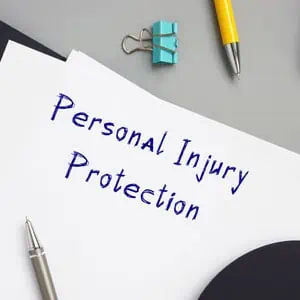The following article covers:
- How PIP coverage works in Maryland and Washington DC and what it covers.
- What to do if your PIP coverage is not enough to pay for your medical costs.
- Reasons why a PIP claim may be denied, such as no PIP coverage or medical expenses not related to the accident.
How Does PIP Cover Work In Maryland And Washington DC And What Does It Cover?

If you have PIP coverage, it will cover medical bills and lost wages that are related to the accident up to your policy limits, regardless of fault. The amount of PIP coverage varies, but typically ranges from $2,500 to $10,000.
PIP doesn’t require you to wait for settlement or trial to receive benefits. This means that you can receive money for medical bills and lost wages right away, instead of waiting months or even years for your case to be resolved.
PIP is also not subject to reimbursement in Maryland. So if you use your PIP coverage to pay for medical bills, you can still submit those bills to the at-fault driver’s insurance carrier and potentially receive additional compensation.
It’s also worth mentioning that PIP coverage does not require you to sign a release, as you would in a settlement. This means that you can receive benefits from PIP while still actively treating your injuries and assessing the full extent of your damages.
What If My PIP Cover Is Not Enough To Pay For My Medical Cost?
If your PIP coverage is not enough to cover all of your medical expenses, there are a few options available to you. If you have health insurance, you can use this as another source to pay for medical expenses.
If you don’t have health insurance or don’t want to pay out of pocket, you can pay the balance out of your recovery if your medical provider is willing to wait until you receive that recovery. Many medical providers will agree to this if you are represented by an attorney who signs a letter of protection. This letter indicates that you and your attorney agree to pay the medical provider out of any recovery you receive.
Not all medical providers will agree to wait for payment, and some may send you to collections or even sue you for the money. However, many providers will agree to wait, especially if you have an attorney representing you.
Why Would My PIP Claim Be Denied?
If you have filed a PIP (Personal Injury Protection) claim, it is important to understand that it may be denied for a variety of reasons, such as:
- No PIP Coverage: Your PIP claim can be denied if the insurance company informs you that you do not have PIP coverage. In Maryland, PIP coverage is mandatory unless you affirmatively waive it. In order to waive PIP, the insurance company will need to have you sign a waiver. To be valid, this waiver must be signed and meet certain statutory requirements, including stating the difference in premiums.
- Medical Expenses Not Related to the Accident: If the insurance company feels that the medical expenses you are claiming are not related to the accident, they may deny your PIP claim. For example, if you were receiving treatment for a neck injury prior to the accident and continued with the same doctor and treatment regimen, the insurance company may argue that the treatment is not related to the accident.
Insurance companies have become better at capturing waivers online. In the past, insurance companies often had difficulty producing waivers when requested. Today, however, they are more likely to provide a signed waiver as proof that PIP coverage was waived.
If you have been denied a PIP claim, you may still be able to prove that the waiver was inappropriate and shouldn’t apply. For example, if a family member waived PIP coverage years ago, but has since died, and you have renewed the premiums without waiving PIP yourself, you may be entitled to PIP benefits.
It is also important to note that while you can waive PIP coverage for yourself and other family members, you cannot waive it for children in your family who are under the age of 16.
If you are a pedestrian and are struck by a vehicle, PIP coverage comes from the striking vehicle. However, if you have waived PIP coverage for yourself, you are not entitled to PIP benefits under the striking vehicle’s policy.
Similarly, if you are a passenger in a car that has PIP coverage, the primary policy for PIP benefits will be the vehicle you are traveling in. Again, if you have waived PIP coverage for yourself, you will not be entitled to PIP benefits under that policy.
However, if you have PIP coverage for yourself and are in an accident, you can still make a claim for PIP benefits even if you were in a car that did not have PIP coverage or a pedestrian struck by a car that did not have PIP. You can turn back to your own insurance company for PIP benefits. Also, if your PIP coverage is greater than the coverage of the primary PIP coverage, the initial portion of your claim will be paid by the primary carrier, and additional benefits would be available under your own policy.
For more information on Personal Injury Protection (PIP) In MD & WA, an initial consultation is your next best step. Get the information and legal answers you are seeking by calling (301) 670-0443 today.